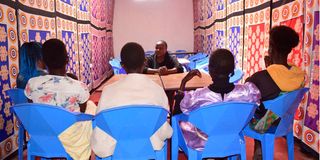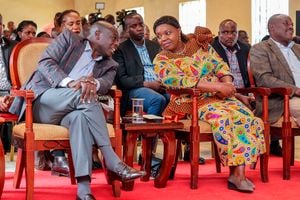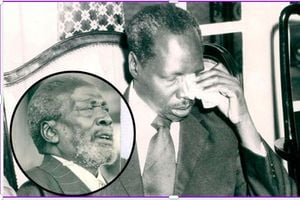GBV survivors close dark chapter and make fresh start in Samburu

Gender violence survivors get fresh start in Samburu. Equipped with new skills, the survivors now run their own businesses and provide for their children after being shunned.
Catherine's* indelible scars bear witness to the painful ordeal she suffered in an abusive marriage.
She hails from a village in Samburu County and was married off at a tender age. She was to be seen and not heard; her voice was stifled.
"Everything was done against my wishes. I could not resist because we — women — are voiceless," she said.
After a few years in marriage, her union was blessed with a child, and this is when her husband revealed his true colours.
Catherine endured punches, caning, merciless kicks and being struck with objects.
The breaking point came, and she decided to escape the abusive marriage — setting out on a journey fraught with challenges.
While she managed to free herself from the agony of a bad marriage, another uphill task awaited her—providing for her eight-month-old baby.
Her abusive husband flatly refused to contribute to their upkeep and this plunged Catherine into a fresh struggle of single motherhood.
"It was me, my baby, and my own world. It was one struggle after another. Meals were uncertain," Catherine narrated.
Feeling abandoned in the wilderness, she could hardly breastfeed her baby due to inadequate meals. Now under intense psychological pressure to provide her basic needs, Catherine, with no formal education or employment, realised the hardships of living without a stable income.
Circumstances forced her to become resilient, and she decided it was time to earn a living in order to support her child.
Catherine borrowed Sh1,500 from a friend and set up a green grocery business in Nomotio on the outskirts of Maralal town.
This was a fresh start after receiving counselling and psychosocial support from the Samburu Women Empowerment Programme, a community-based organisation in Maralal town.
The programme not only provided crucial support but also helped Catherine realise her business potential.This offered her a new perspective on life.
"I realised I had a lot of potential in my hands. Although the grocery business is challenging, at least I do not go hungry as I used to in the past few months," she said.
She is determined to tackle the uncertainties of the future and is dreaming of opening a bigger grocery shopping store in Maralal town soon.
Mary*, another survivor of gender-based violence (GBV), fled and returned to her parents' home.
Forced into marriage by an unexpected teen pregnancy, Mary regretted the decision when her husband's demeanour changed upon learning that she was expectant.
"He changed the moment I revealed to him that I was pregnant. I was forced to marry him, but I regret the move," Mary explained.
When she returned home her family provided her with shelter, while Mary struggled to buy food, hygiene products, and medicine for her one-year-old child.
The reception at home upon leaving her abusive marriage was not entirely supportive, and she found herself having to deal with difficult circumstances.
With her meagre savings, Mary became a fruit vendor in Maralal town so that she could provide for her baby. Her journey as a GBV survivor has been a tough lesson, but she was determined to overcome the obstacles.
Faith*, another survivor, turned to bead-making to earn a living after leaving her marriage. She had been married off at a tender age.
Despite the negative connotations associated with beaded necklaces in Samburu County, where they are often used to arrange marriages, Faith transformed this tradition into economic empowerment.

A gender violence survivor knits bracelets in Maralal, Samburu County. The teen mother ventured into bead-making to earn a living after leaving her abusive marriage.
"We normally learn this from childhood as a hobby. But I am seeking to monetise by making it an income-generating activity," Faith stated.
By turning the necklaces into a source of income, Faith is able to meet her daily needs. In Samburu County, bead-making is big business, and Faith has set out on a path to economic empowerment.
Njeri Mugo is a co-founder of the Samburu Women Empowerment Programme and explained how they support GBV survivors.
The programme has assisted 200 members, including teen mothers and widows who have faced various forms of GBV. Out of this number, 60 women have embarked on income-generating activities after receiving intense psychosocial support, counselling, and training.
"They are really positive, and they are accepting their situation. Many of them have learnt new skills, and others are willing to learn too," sayis Ms Mugo.
Also Read: County adopts mobile app to tackle GBV
The women who are are now running their businesses have experienced a marked improvement in their lives.
Ms Mugo said the programme has had a positive impact on the womens’ live. She said they have become confident and are willing to share their stories boldly.
In addition to running businesses, 15 teen mothers have resumed their studies in various schools; two have been enrolled in colleges, and 10 are undergoing vocational training in Samburu.
The women in the programme have formed groups and are engaging in table banking and are investing money earned from their daily activities.
"They have even purchased water tanks and are now selling water. That is a massive step for the people who were once hopeless," Ms Mugo said.
The Samburu Women Empowerment Programme has plans to begin dance classes so as to raise school fees for teen mothers .
Despite the prevailing negative cultural practices contributing to high teenage pregnancies in Samburu, the GBV survivors are breaking free from the cycle of abuse, finding strength, and building a better future through entrepreneurship.
Ms Mugo said there are plans to bring Samburu elders on board as ambassadors in the fight against gender violence. Multiple declarations and agreements have been made by Samburu elders to abolish GBV in the region.
Empowering GBV survivors is aimed at helping the women reclaim control over their lives through entrepreneurship.





